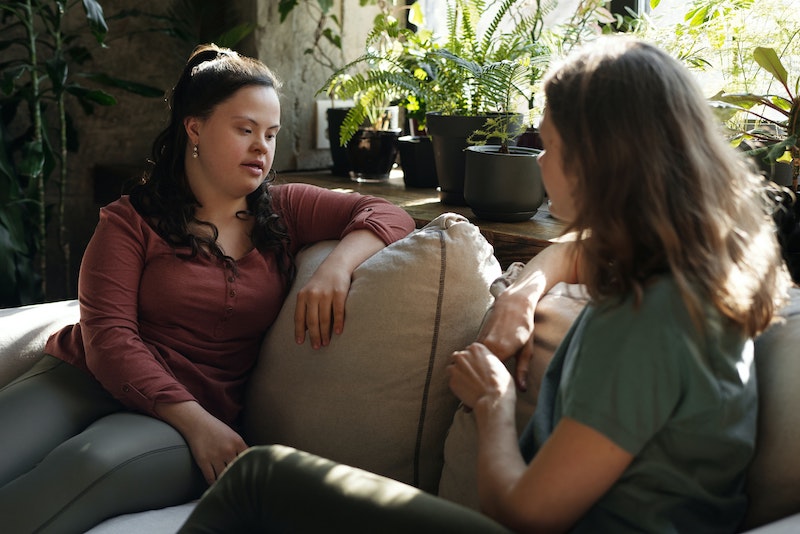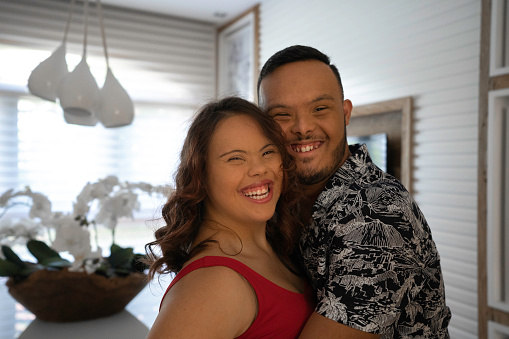The world we live in doesn’t make it easy to be different and yet it’s estimated that 30-40% of the population is considered neurodiverse. Folks with disabilities can often feel challenged or misunderstood engaging with their sexuality. In part one of this blog, we focused on physical disabilities / challenges with sex, and in part two we will focus on neurodiversity. As we explore neurological and developmental differences, remember that disabilities and differences do not imply dysfunction or brokenness. No matter how profoundly differently abled you are, your personhood cannot be diminished.
What Does it Mean to Be Neurodivergent?
Here are some definitions that might be helpful if this topic is new to you:
- Neurodiversity: The variation and differences in neurological structure and function that exist among human beings. Neurodiveristy is viewed as normal and natural rather than pathological. Think of it as a big umbrella with many alter-abilities underneath. Neurodiversity points toward the different abilities in our community.
- Neurodivergent: Telating to or showing atypical neurological behavior and development. This can look like autism, ADHD, sensory processing disorders, and generally points to the different abilities of the individual.
- Neurotypical: People are described this way if they don’t have a diagnosis of any intellectual or developmental difference.
Some of the challenges that might arise due to neurodivergence may look like becoming easily overstimulated, easily distracted, difficulty communicating, or difficulty coping with tough emotions. If you and/or your partner are neurodivergent, approach this subject with an extra dose of care and patience. Foster openness and curiosity in your relationship. And if you’re feeling stuck and could use some help addressing this topic ( please reach out here).

Sex Education
When it comes to sex to education, much of the neurodiverse community is not taken into consideration. They are often left out completely because neurotypical people might assume that they don’t desire sex. This is far from the truth. Sex education, sexual health and exploring sexual fulfillment is a right that belongs to all humans. Knowing about and understanding sex is something that needs be readily available to us all.
Quality comprehensive sex ed is important for undesrtanding bodies, relationships, and best practices for sexual health and safety. It will also help you understand more about what you want and need. Many school-based sex ed leaves much to be desired and does not equip students with the vital information they need for their sexual health. If you are neurodivergent or simply are looking for some more education, websites like this one might be a helpful and encouraging place to start.
Self-Esteem and Self-Love
You deserve to feel good and be loved just the way you are. Allowing yourself to be vulnerable and sharing your needs can feel difficult no matter who you are. Start by getting to know yourself, your body, and your erotic mind. Take time to nurture a positive relationship with your sexual self. The more you know about yourself, the easier it is to know what you want from a partner.

Communication
Find a time and space with your partner (one that is comfortable for both of you) to talk about what you want and need from your sexual relationship. Share your preferences and what you might be curious about exploring more of, or less of or not for now. What feels like a strong YES or a firm NO or a possible MAYBE to each of you? Agree on specific words and actions that you want to include, and clarify your understanding of them. An example of this might sound like: “When I am uncomfortable, I might have a hard time telling you. I will get quiet. Please check in with me regularly and notice my body language.”
If your disability hinders your capacity to communicate using words, you can find different ways to communicate. It might also help to find a person to support to you have these conversations, like a sex educator or a sex coach who is well-received and experienced in the neurodiverse community.
Sensitivities
Couples who are neurodiverse might have different sensory experiences that can act as both a benefit and a block to satisfying sexual interactions. Hyper– and hypo-sensitivities (being prone to feeling over- or under- stimulated) are helpful to know and understand about each other. For example, if one of you feels a stronger desire for physical touch while the other gets overwhelmed with that amount, this can create an imbalance. You may both feel that your needs are not being met if it’s not brought, processed and up mutually understood. Here are some pointers when you go into this kind of conversation:
- Approach this subject with curiosity and gentleness.
- Ask each other specific questions (“How does it feel when I ___?”)
- Get specific with your answers! (“I feel distracted and overwhelmed when ___”)
- Seek pleasure and understanding for each other and for yourself
Expectations
Negative experiences, poor sex education, or a lack of experience can lead to unrealistic expectations around sex and romance. With kind and considerate conversation, try to explore any preconceived notions or expectations you might have about your relationship. When frustrations arise, it’s often because things aren’t going according to a belief or expectation about how they “should” be. Rather than trying to reach a specific goal, focus on pleasure and connecting with yourself and with your partner.

Ask For Help If You Need It
There are plenty of resources out there if you are neurodiverse or think you might be. Truly, all of the advice and information here applies just as well to neurotypical people. We can all benefit from compassionate communication, curiosity, and pleasure! I’m here for you if you want professional support on your journey!

